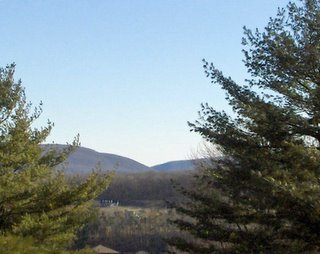

Today the temperature actually rose into the fifties for the first time in several weeks. I took advantage of the warmth to go walking in the woods behind our place. Of course I took the I-pod along. At first I was listening to Betty "BeBop" Carter until I got to her rendition of "Spring Can Really Hang You Up" from the "Inside" album. Totally inappropriate! I switched over to Aaron Copeland's "Appalachian Spring". I have problems with that one too, but at least he doesn't say that "Spring is a bore."
Copeland himself was a thoroughly disgusting character. An unrepentant Stalinist, and public apologist for one of the most brutal terror regimes in history, he has been lionized by the loony left as a victim of McCarthyism. In fact he played up his "victimization" and his career benefited. His private life was equally problematic. He was a homosexual pederast who preyed upon his young "students," often with the cooperation of their parents. His paeans to youth and the common man should be seen, or listened to, in that context.
The original song on which Copeland's "Appalachian Spring" was based is a dance tune composed by Joseph Brackett, Jr., a Shaker elder, in 1848. The Shakers ["United Society of Believers in Christ's Second Appearance"] were one of the communitarian sects that founded "backwoods utopias" up and down the frontiers of antebellum America. They were followers of "Mother Ann Lee" an eighteenth-century radical Quaker who proclaimed herself to be the reincarnation of Jesus Christ. They renounced the materialism and individualism of the outside world and retreated into closed communes where they practiced lives of chastity and simplicity.
Their commitment to primitive communalism, their redefinition of gender roles, their hostility to traditional Christianity, and their historical association with the British proletariat no doubt commended the Shakers to Copeland as they have to numerous modern scholars. [For an overview of their beliefs, their history, and a brief bibliography go here]. I never found them particularly interesting [the Oneida people, now they were interesting -- they had this thing they called "complex marriage", but that's for another day, another post].
"Simple Gifts"
Here are the lyrics:
It is easy to understand the appeal of such sentiments. At times withdrawal into a simpler reality is appropriate, even necessary. That's why I like to walk the woods. But it can never be more than a diversion or a retreat. At their peak the Shakers had a worldwide membership of only a few thousand individuals and their villages had already become a tourist attraction for the "worldly" men and women who would come on Saturday evenings to view their eccentricities. In the larger sense, they mattered for little, but they linger on in Copeland's music, and in the imaginations of romantic lefties in academia. Those are appropriate repositories for their memory.'Tis the gift to be simple,
'tis the gift to be free,
'tis the gift to come down where you ought to be,
And when we find ourselves in the place just right,
It will be in the valley of love and delight.Refrain:
When true simplicity is gained,
To bow and to bend we shan't be ashamed.
To turn, turn will be our delight,
'Til by turning, turning we come round right'Tis the gift to be loved and that love to return,
'Tis the gift to be taught and a richer gift to learn,
And when we expect of others what we try to live each day,
Then we'll all live together and we'll all learn to say,Refrain:
'Tis the gift to have friends and a true friend to be,
'Tis the gift to think of others not to only think of "me",
And when we hear what others really think and really feel,
Then we'll all live together with a love that is real.Refrain:
Why this?
On this day in 1981 Congress declared March to be "Women's History Month" and so it was proclaimed by President Reagan. On such a day it is appropriate to remember people who, however marginal, believed that God was manifested in both male and female forms, who worshiped the female incarnation of that deity, and who expressed a view of common humanity that transcended sexual categories. No wonder feminist historians keep revisiting them, like the "worldly" visitors who used to show up at their meetings to marvel at what they saw?
No comments:
Post a Comment